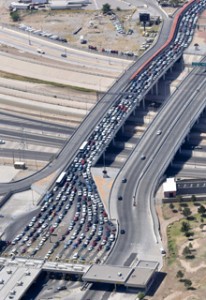Quick and seamless passage across the U.S.-Mexico border has long been the Holy Grail for any commercial interest whose success depends on transportation efficiency. And for just as long, the safety inspection process at the border has represented the most persistent roadblock to that aspiration.
With roughly $600 billion in combined imports and exports crossing that border each year, bottlenecks continue to strain the capacity of land ports, creating delays that threaten the efficiency of ever-increasing international trade.
In ascertaining wait times, officials measure the number of minutes from the moment a truck begins to hold in line in one country until it exits the port of entry in the other country, taking into account the various inspection steps required between point A and point B.
Agencies on both sides have put into place various programs to minimize those crossing times, most notably the Free and Secure Trade (FAST) program in the wake of the 9-11 terrorist attacks. FAST allows for expedited crossings by commercial vehicles hauling low-risk shipments entering the U.S. from Canada and Mexico. FAST gives dedicated lane access and passage preference to those carriers who have completed background checks and met eligibility requirements.
U.S. and Mexican agencies also initiated the Unified Cargo Processing (UCP) program in 2018, which streamlines the vehicle inspections conducted by Aduanas Mexico and the U.S. Customs and Border Protection agency.
Together, FAST and UCP have helped to shorten average crossing times for commercial vehicles to 31 minutes at the Ysleta-Zaragoza port of entry. That’s 19 minutes quicker than the average time for trucks using non-FAST dedicated lanes at that crossing point.
But it’s not only the duration of the wait time that matters; also important is the reliability of that downtime. Wait time reliability illustrates how much the pause can vary — often wildly — throughout the day. Those intervals could be as short as 14 minutes, or as long as 100 minutes. That inconsistency isn’t conducive to efficient business operations. When a shipment — food product, construction material, whatever it may be — doesn’t arrive when it’s supposed to arrive, every downstream step in the process is hampered.
When shippers are required to build in a time cushion or buffer to every trip, they’re sacrificing time that could otherwise be applied to moving more of their goods, which in turn could contribute to higher production levels — and stronger profits — farther down the line.
And so, my colleagues and I at the Center for International Intelligent Transportation Research are working now to enhance FAST by creating the Fast and Secure Trade with Enhanced Reliability (FASTER) framework to improve crossing time reliability. We’ll do that by assembling a set of traffic management and communication procedures that will serve the interests of all stakeholders.
With maximum reliability, commercial enterprises will be better able to ensure that shipments arrive on time, all the time.
When time is money, fast is good — but faster is better.
David Salgado Manzano is an assistant research scientist with TTI’s Center for International Intelligent Transportation Research.


